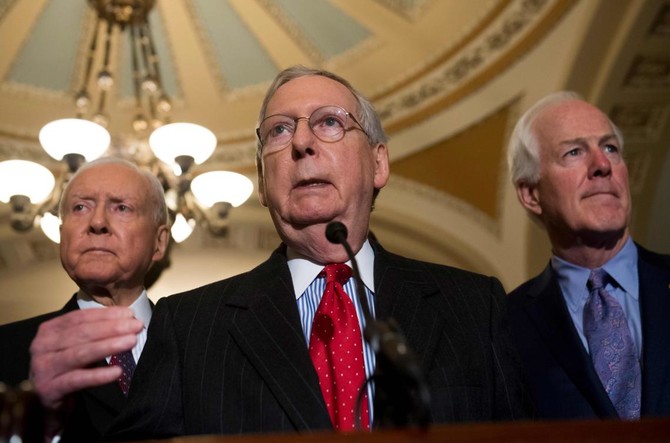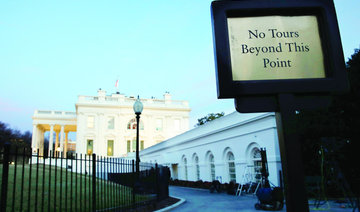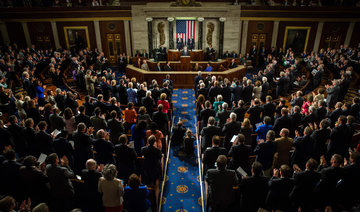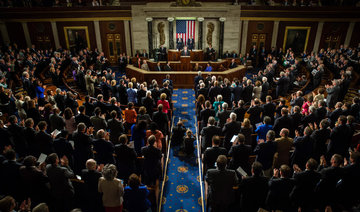WASHINGTON: The top senator from US President Donald Trump’s party urged lawmakers to “step back from the brink” as they gathered Sunday for a crunch vote to keep the government shutdown from stretching into the coming work week.
Hundreds of thousands of federal employees are set to stay home without pay as of Monday morning following the dramatic collapse Friday night of talks to agree on an urgent funding measure.
The shutdown cast a huge shadow over the first anniversary of Trump’s inauguration as president and highlighted the deep divisions between Republicans and Democrats.
Senate Majority Leader Mitch McConnell warned that the shutdown would “get a lot worse” if federal workers have to stay home without pay.
“Today would be a good day to end it,” McConnell said from the Senate floor during a rare Sunday session aimed at hashing out a deal ahead of a vote he said would take place at 1:00 am (0600 GMT) Monday, unless progress is made sooner.
Lawmakers have traded bitter recriminations for the failure to pass a stop-gap funding measure, and McConnell once again sought to pin the blame on Senate Minority Leader Chuck Schumer.
Trump early Sunday encouraged the Senate’s Republican leaders to invoke the “nuclear option” — a procedural maneuver to change the chamber’s rules to allow passage of a budget by a simple majority of 51 votes to end the shutdown.
“If stalemate continues, Republicans should go to 51% (Nuclear Option) and vote on real, long term budget, no C.R.’s!” he tweeted, referring to the stop-gap funding measure.
But Senate leaders have been wary of such a move in the past, as it could come back to haunt them the next time the other party holds a majority.
White House budget director Mick Mulvaney on Sunday accused some Democrats of wanting to “deny the president sort of the victory lap of the anniversary of his inauguration” — echoing a complaint Trump made on Twitter the day before.
“There’s other Democrats who want to see the president give the State of the Union during a shutdown,” Mulvaney said on Fox, referring to the nationally televised address Trump is to deliver on January 30.
At the heart of the dispute is the thorny issue of undocumented immigration.
Democrats have accused Republicans of poisoning chances of a deal and pandering to Trump’s populist base by refusing to back a program that protects an estimated 700,000 “Dreamers” — undocumented immigrants who arrived as children — from deportation.
Schumer said he and Democrats were willing to compromise, but Trump “can’t take yes for an answer — that’s why we’re here.”
“I’m willing to seal the deal, to sit and work right now with the president or anyone he designates — let’s get it done,” Schumer said.
Trump has said Democrats are “far more concerned with Illegal Immigrants than they are with our great Military or Safety at our dangerous Southern Border.”
Essential federal services and military activity are continuing, but even active-duty troops will not be paid until a deal is reached to reopen the US government.
There have been four government shutdowns since 1990. In the last one, in 2013, more than 800,000 government workers were put on temporary leave.
“We’re just in a holding pattern. We just have to wait and see. It’s scary,” Noelle Joll, a 50-year-old furloughed US government employee, told AFP in Washington.
A deal had appeared likely on Friday afternoon, when Trump — who has touted himself as a master negotiator — seemed to be close to an agreement with Schumer on protecting Dreamers.
But no such compromise was in the language that reached Congress for a stop-gap motion to keep the government open for four more weeks while a final arrangement is discussed. And Republicans failed to win enough Democratic support in the Senate to bring it to a vote.
Republicans have a tenuous one-seat majority in the Senate, and on Friday needed to lure some Democrats to their side to get a 60-vote supermajority to bring the motion forward. They fell 10 votes short.
The measure brought to Congress would have extended federal funding until February 16 and reauthorized for six years a health insurance program for poor children — a long-time Democratic objective.
But it left out any action on the Deferred Action on Childhood Arrivals program, known as DACA, that affects Dreamers.
White House officials insisted there was no urgency to fix DACA, which expires March 5.
Highlighting the deep political polarization, crowds estimated to number in the hundreds of thousands took to the streets of major US cities including Los Angeles, New York and Washington over the weekend to march against the president and his policies and express support for women’s rights.
Protesters hoisted placards with messages including “Fight like a girl,” “A woman’s place is in the White House” and “Elect a clown, expect a circus.”
Lawmakers to vote on pulling US ‘back from brink’ on shutdown
Lawmakers to vote on pulling US ‘back from brink’ on shutdown

Under tariff threat, US wholesaler warns: ‘People will pay’

- No matter what happens in January, retailer Melquiades Flores says he has no option but to keep importing produce from Mexico
- The tomato-growing season in California lasts four months. The rest of the year, he gets the produce from Mexico
The tomato-growing season in California lasts four months; the rest of the year, he gets the produce from Mexico
LOS ANGELES: While most of Los Angeles sleeps, 58-year-old Melquiades Flores starts his day at 1 a.m., supervising the unloading of produce at M&M Tomatoes and Chile Company, the wholesaler he started in 2019.
But the business that Flores hopes to pass to his children one day is bracing for a disruption.
US President-elect Donald Trump has pledged to impose a 25 percent tariff on all imports from Mexico and Canada when he takes office on Jan. 20, plus an additional 10 percent tariff on Chinese goods.
“Produce of Mexico” is stamped on almost all the boxes of tomatoes and chilies that arrive at Flores’ downtown warehouse, destined for homes, hotels and restaurant kitchens across the city.
“People will have to pay a higher price. Whatever they charge us, we will pass on to the consumer,” Flores said from his section of the larger complex, the Los Angeles Wholesale Produce Market.
No matter what happens in January, Flores says he has no option but to keep importing produce from Mexico. The tomato-growing season in California lasts four months, from August to November, he says. The rest of the year, he gets the produce from the Mexican states of Sinaloa, Baja California and Sonora.
His team stacks boxes upon boxes of tomatoes in every size and shade of red, plus some shiny green ones for making zesty tomatillo sauce.
“Any tariff is an added tax that impacts all of us, including those who buy a pound, two pounds, or a thousand or 10,000 pounds,” said Flores, who has lived in Los Angeles for 40 years and is originally from the Mexican state of Morelos.
Trump has pronounced his love of tariffs, presumably for raising revenue and protecting US industries against imports, but he avoids speaking about the inflationary effect or the impact of potential retaliation from the United States’ top three trading partners.
Officials from Mexico, Canada and China and major industry groups have warned that the tariffs Trump proposes would harm the economies of all involved, cause inflation to spike and damage job markets.
“The president should have first seen how much this will impact everyone before speaking,” Flores said.
Biden readies $725 million arms aid package for Ukraine, sources say

WASHINGTON: US President Joe Biden’s administration is preparing a $725 million weapons package for Ukraine, two US officials said on Wednesday, as the outgoing president seeks to bolster the government in Kyiv before leaving office in January.
According to an official familiar with the plan, the Biden administration plans to provide a variety of anti-tank weapons from US stocks to blunt Russia’s advancing troops, including land mines, drones, Stinger missiles, ammunition for High Mobility Artillery Rocket Systems (HIMARS).
The package is also expected to include cluster munitions, which are typically found in Guided Multiple Launch Rocket System (GMLRS) rockets fired by HIMARS launchers, according to the notification, seen by Reuters.
The formal notification to Congress of the weapons package could come as soon as Monday, one official said.
The contents and size of the package could change in the coming days ahead of Biden’s expected signature.
It marks a steep uptick in size from Biden’s recent use of so-called Presidential Drawdown Authority (PDA), which allows the US to draw from current weapons stocks to help allies in an emergency.
Recent PDA announcements have typically ranged from $125 million to $250 million. Biden has an estimated $4 billion to $5 billion in PDA already authorized by Congress that he is expected to use before Republican President-elect Donald Trump takes office on Jan. 20.
The United States has not exported land mines in decades, and their use is controversial because of the potential harm to civilians. Although more than 160 countries have signed a treaty banning their use, Kyiv has been asking for them since Russia launched its full-scale invasion in early 2022 and Russian forces have used them on the front lines.
Russian forces currently are making gains in Ukraine at the fastest rate since the early days of the 2022 invasion, taking an area half the size of London over the past month, analysts and war bloggers said this week.
The United States expects Ukraine to use the mines in its own territory, though it has committed not to use them in areas populated with its own civilians.
Trump on Wednesday tapped Keith Kellogg, a retired lieutenant general who presented him with a plan to end the war in Ukraine, to serve as special envoy for the conflict. Quickly winding down the Ukraine war was one of Trump’s central campaign promises, though he has avoided discussing how he would do so.
Tariff plan would hurt both the US and Mexico, Sheinbaum tells Trump

- Mexico says Trump tariffs would kill 400,000 US jobs and drive up prices for US consumers
- Sheinbaum also warned that Mexico would retaliate if Trump makes good his tariff plan
MEXICO CITY: Mexico’s president discussed migration and drug trafficking with US President-elect Donald Trump on Wednesday — two issues he had raised as justification for raising import tariffs on America’s southern neighbor.
Claudia Sheinbaum said she had had “an excellent conversation” with Trump, just hours after her economy minister warned that the cost to US companies of Trump’s tariffs would be “huge.”
“We discussed Mexico’s strategy regarding the phenomenon of migration,” Sheinbaum said on X, adding she had told Trump that caravans of migrants “are not arriving at the northern border because they are being attended to in Mexico.”
Earlier on Wednesday, Sheinbaum said Mexico would retaliate if US President-elect Donald Trump followed through with his proposed 25 percent across-the-board tariff, a move her government warned could kill 400,000 US jobs and drive up prices for US consumers.
“If there are US tariffs, Mexico would also raise tariffs,” Sheinbaum said during a press conference, in her clearest statement yet that the country was preparing possible retaliatory trade measures against its top trade partner.
Mexican Economy Minister Marcelo Ebrard, speaking alongside Sheinbaum, called for more regional cooperation and integration instead of a war of retaliatory import taxes.
“It’s a shot in the foot,” Ebrard said of Trump’s proposed tariffs, which appear to violate the USMCA trade deal between Mexico, Canada and the US.
Discussion with Trump
In her talks with Trump later, she said they discussed “strengthening collaboration on security issues” as well as “the campaign we are conducting in the country to prevent the consumption of fentanyl.”
Trump on Monday said he would impose tariffs of 25 percent on Mexican and Canadian imports and 10 percent on goods from China.
“This Tariff will remain in effect until such time as Drugs, in particular Fentanyl, and all Illegal Aliens stop this Invasion of our Country!” Trump wrote on his Truth Social page.
The Republican, who won an election in which illegal migration was a top issue, has vowed to declare a national emergency on border security and use the US military to carry out a mass deportation of undocumented migrants.
Mexican Economy Minister Marcelo Ebrard said Wednesday some “400,000 jobs will be lost” in the United States if Trump followed through on his threat. He cited a study based on figures from US carmakers that manufacture in Mexico.
Tariff impact
Ebrard said the tariffs would also hit US consumers hard, citing the US market for pickup trucks — most of which are manufactured in Mexico. The tariffs, the minister said, would add $3,000 to the cost of a new vehicle.
“The impact of this measure will chiefly be felt by consumers in the United States... That is why we say that it would be a shot in the foot,” Ebrard told reporters, speaking alongside Sheinbaum at her regular morning conference.
The proposed tariffs would hit the automotive sector’s top cross-border exporters especially hard, Ebrard added, namely Ford, General Motors and Stellantis.
Ebrard noted that 88 percent of pickup trucks sold in the US are made in Mexico and would see a price increase. These vehicles are popular in rural areas that overwhelmingly voted for Trump.
Mexico and China have been particularly vociferous in their opposition to Trump’s threats of a trade war from day one of his second presidential term, which begins on January 20.
Sheinbaum has declared the threats “unacceptable” and pointed out that Mexico’s drug cartels exist mainly to serve drug use in the United States.
China has warned that “no one will win a trade war.”
During his first term as president, Trump launched full-blown trade hostilities with Beijing, imposing significant tariffs on hundreds of billions of dollars of Chinese goods.
China responded with retaliatory tariffs on American products, particularly affecting US farmers.
The United States, Mexico and Canada are tied to a three-decade-old largely duty-free trade agreement, called the USMCA, that was renegotiated under Trump after he complained that US businesses, especially automakers, were losing out.
Many analysts regard Trump’s tariff threats as more of a negotiating tactic than trade policy.
“The lack of a clear link between this threat and questions related to trade suggests the new president plans to use tariffs as a negotiating strategy to achieve goals largely unrelated to trade,” said David Kohl, chief economist at Julius Baer.
Profit wiped out
Mexico’s automotive industry is the country’s most important manufacturing sector, exporting predominantly to the United States. It represents nearly 25 percent of all North American vehicle production.
Analysts at Barclays said they estimate the proposed tariffs “could wipe out effectively all profits” from the Detroit Three automakers.
“While it’s generally understood that a blanket 25 percent tariff on any vehicles or content from Mexico or Canada could be disruptive, investors under-appreciate how disruptive this could be,” they wrote in a note on Tuesday.
Brian Hughes, a spokesperson for Trump’s transition team, said the tariffs would protect US manufacturers and workers from “unfair practices of foreign companies and foreign markets.”
Hughes said Trump would implement policies to make life affordable and more prosperous for his country.
GM and Stellantis declined to comment. Ford did not comment on how the threatened tariffs would affect its business but said it manufactures more vehicles in the United States than most major automakers.
Mexico’s automotive industry group AMIA said it would prepare for any possibility and wait to see what formal actions are taken.
The Institute of International Finance, a trade group for the global financial services industry, warned Mexico-US relations would be challenging going forward.
“The imposition of tariffs, eventually leading to increased protectionism, and other policies affecting exchange rates and commodity prices could have significant implications for the region,” it said in a note.
The USMCA is up for review in 2026.
Katia Goya, director of international economics at Grupo Financiero Banorte, said it was likely the three USMCA countries would seek wholesale renegotiation of the pact rather than just rubber-stamp it to continue in its current form.
“The effect of a trade-conflict situation is that it will mean lower economic growth in the United States, higher unemployment and higher inflation,” Goya said.
Ebrard said USMCA trade amounted to $1.78 trillion in the first nine months of this year.
“We can fragment and divide with tariffs,” Ebrard said. “Mexico does not want conflicts and divisions, but to build a stronger region.”
British police launch new investigation into people linked to late Harrods boss Al-Fayed

- The BBC documentary said Harrods failed to intervene and helped cover up abuse allegations during his ownership
LONDON: British police said they had launched an investigation into whether people linked to the late Egyptian billionaire Mohamed Al-Fayed helped enable his alleged rape and other sexual abuse of female staff at his London department store Harrods and elsewhere.
A BBC documentary reported in September that Al-Fayed, who died last year aged 94, had sexually abused female staff, forced them to have medical screenings and threatened consequences if they tried to complain.
Al-Fayed always denied similar accusations before his death.
“This investigation is about giving survivors a voice, despite the fact that Mohamed Al-Fayed is no longer alive to face prosecution,” Commander Stephen Clayman from London’s Metropolitan Police Service said in a statement on Wednesday.
“However, we are now pursuing any individuals suspected to have been complicit in his offending, and we are committed to seeking justice.”
He did not say how many people were under investigation.
Lawyers representing victims have said the abuse took place not just at Harrods but also in other locations linked to Al-Fayed’s business empire, such as Fulham Football Club, the Ritz Paris hotel and his estate in Surrey, saying more than 400 people had come forward.
The BBC documentary said Harrods failed to intervene and helped cover up abuse allegations during his ownership.
Harrods has apologized and said it is “appalled” by the allegations. It has launched a process for any current or former Harrods employees who wished to claim compensation, although the plan has been criticized by victims’ lawyers.
The MPS said 90 victims had come forward over the last two months.
Earlier this month, the MPS referred itself to the police watchdog over its handling of two complaints against Al-Fayed in 2008 and 2013. The MPS said it would review all historical reports made against Al-Fayed.
US sanctions Venezuela security chiefs for crackdown

WASHINGTON: The United States slapped sanctions on 21 top Venezuelan security and cabinet officials Wednesday, accusing them of a campaign of repression after President Nicolas Maduro’s bitterly contested July reelection.
The fresh measures — which Venezuela rejected as a “desperate act” against “patriots” — come after Washington and the G7 said they recognized opposition candidate Edmundo Gonzalez Urrutia as president-elect, amid accusations of fraud against Maduro.
“Maduro and his representatives’ repressive actions in the wake of the Venezuelan presidential election are a desperate attempt to silence the voices of its citizens,” Bradley Smith, the acting under secretary of the Treasury Department, said in a statement.
Fifteen leaders of the Venezuelan security apparatus are among those hit by an asset freeze, including the heads of the intelligence service, military counterintelligence service, the national guard and the police.
The sanctions also target the Venezuelan communications minister and the head of the prison service.
“All of these entities are part of Maduro’s security apparatus and are responsible for violently repressing peaceful protesters and carrying out arbitrary detention,” a senior US administration official told reporters.
A Venezuelan foreign ministry statement said the country “rejects with the utmost firmness” the latest sanctions of the “outgoing US government against the Venezuelan people and, in particular, a group of patriots who have dedicated themselves to safeguarding peace, stability, economic recovery and national unity in the face of fascist violence.”
The US Treasury said Venezuelan security forces had also issued an “unjustified arrest warrant” for Urrutia, forcing him to flee to Spain.
At the same time, the US State Department said it was expanding visa restrictions on Maduro’s allies.
“Maduro’s security apparatus has engaged in widespread abuses, including killings, repression, and mass detention of protesters,” the State Department said in a statement.
In September, the United States announced sanctions against 16 Venezuelan officials over alleged election fraud.
They included senior figures in the Venezuelan electoral council and Supreme Court, with the US Treasury saying at the time that they “impeded a transparent electoral process and the release of accurate election results.”
Maduro claimed victory in the election and defied intense domestic and international pressure to release detailed polling numbers to back up the assertion.
Amid an outcry at home and abroad, the former bus driver handpicked by the late authoritarian strongman Hugo Chavez is now serving his third term.
But the oil-rich country’s economy is in shambles, as Venezuelans endure acute shortages of food, medicine and other basic goods.
Maduro is accused of leading a harshly repressive leftist regime, with a systematic crackdown on the opposition.





















